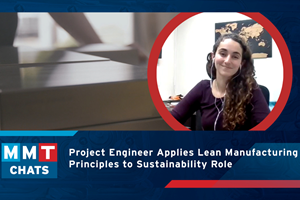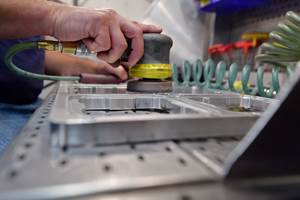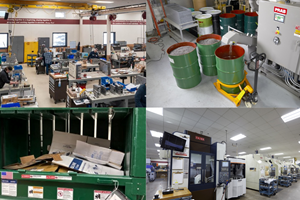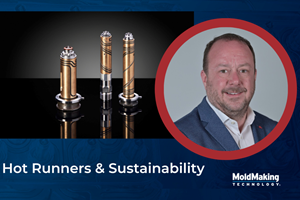Moldmakers Can Benefit from Energy Service Companies
An energy service company (ESCO) is a professional business that provides a wide array of comprehensive energy solutions—which can encompass the design and implementation of energy savings projects, energy infrastructure outsourcing, energy conservation, energy supply and power generation.
An energy service company (ESCO) is a professional business that provides a wide array of comprehensive energy solutions—which can encompass the design and implementation of energy savings projects, energy infrastructure outsourcing, energy conservation, energy supply and power generation. These ESCOs need subcontractors to perform various services, like precision machining, quality control maintenance and parts delivery. Why not take a service you currently offer and start a dialogue with one of these companies to expand your capabilities?
How It Works
An ESCO will come into a company to identify and evaluate any energy-saving opportunities, develop engineering designs and specifications, implement and install energy-efficient solutions, then manage/maintain the solution to ensure that energy savings are realized during a set payback period. According to the Energy Services Coalition (ESC)—a national nonprofit organization of experts from a number of organizations that work together on a state and local level to increase energy efficiencies and building upgrades through energy savings performance contracting—a reliable ESCO will help a business implement a program from start to finish and guarantee the savings will cover all project costs.
Moldmaking industry observer and contributor Patrick Toensmeier, who recently wrote about ESCOs (moldmakingtechnology.com/articles/nl_070902.html), elaborates. “The Department of Energy (DOE) program awards Energy Savings Performance Contracts to ESCOs,” he notes. “The program has been around for a decade. It lets federal agencies achieve energy savings without up-front capital costs or special appropriations, by having private companies assume responsibility for the cost and results of installing energy-efficient systems.
“An ESCO bids to supply systems to a new or renovated building and calculates the savings based on a contract that lasts up to 25 years,” Toensmeier continues. “If a building is using $2 million worth of energy annually and the ESCO cuts that in half, the profit would be $1 million per year over the life of the contract, or as much as $25 million. This is paid to the ESCO as a loan to finance the project. The annual energy savings are used to pay down the loan. If the savings aren’t achieved, the ESCO makes up the difference.”
An Energizing Opportunity
The demand for increased energy efficiencies is on the upswing. Toensmeier points out that not only is the Obama administration committed to energy efficiency, but both the General Services Administration and the Department of Veteran Affairs have earmarked billions for new and renovated buildings.
There are 16 ESCOs (see ESCOs sidebar) whose contracts are in effect until December 2016. Conducting some Internet research on the ESCOs in your area may lead to contract work for your company. You also can look up alternative energy companies on the Web, and narrow your search by industry. The Department of Energy’s website (energy.gov) is a great place to start.
Related Content
MMT Chats: Project Engineer Applies Lean Manufacturing Principles to Growing Sustainability Role
MoldMaking Technology Editorial Director Christina Fuges catches up with MMT’s 30-Under-30 Honoree Katherine Pistorius, who has added Regional Sustainability Coordinator alongside her Project Engineer duties, which demonstrates the many paths one can take in a manufacturing career. Here she shares how this opportunity unfolded for her and what the job entails today and in the future. This episode is brought to you by ISCAR with New Ideas for Machining Intelligently.
Read MoreInnovative Mold Building Enhances Packaging Material Efficiency, Elevates Recyclable Design
A manufacturing-focused design and optimized tooling enhance material efficiency in packaging for a new medical instrument.
Read MorePerspectives on Sustainability in Mold Building: A Diverse Outlook
In conversations with individuals involved in the mold building industry, a variety of perspectives on sustainability emerged, showcasing the multifaceted nature of the term.
Read MoreVIDEO: Hot Runners and Sustainability
Oerlikon HRSflow North America Sales Director Robert Harvey breaks down hot runner technology that addresses sustainability opportunities and challenges.
Read MoreRead Next
How to Use Continuing Education to Remain Competitive in Moldmaking
Continued training helps moldmakers make tooling decisions and properly use the latest cutting tool to efficiently machine high-quality molds.
Read MoreAre You a Moldmaker Considering 3D Printing? Consider the 3D Printing Workshop at NPE2024
Presentations will cover 3D printing for mold tooling, material innovation, product development, bridge production and full-scale, high-volume additive manufacturing.
Read MoreHow to Use Strategic Planning Tools, Data to Manage the Human Side of Business
Q&A with Marion Wells, MMT EAB member and founder of Human Asset Management.
Read More




















